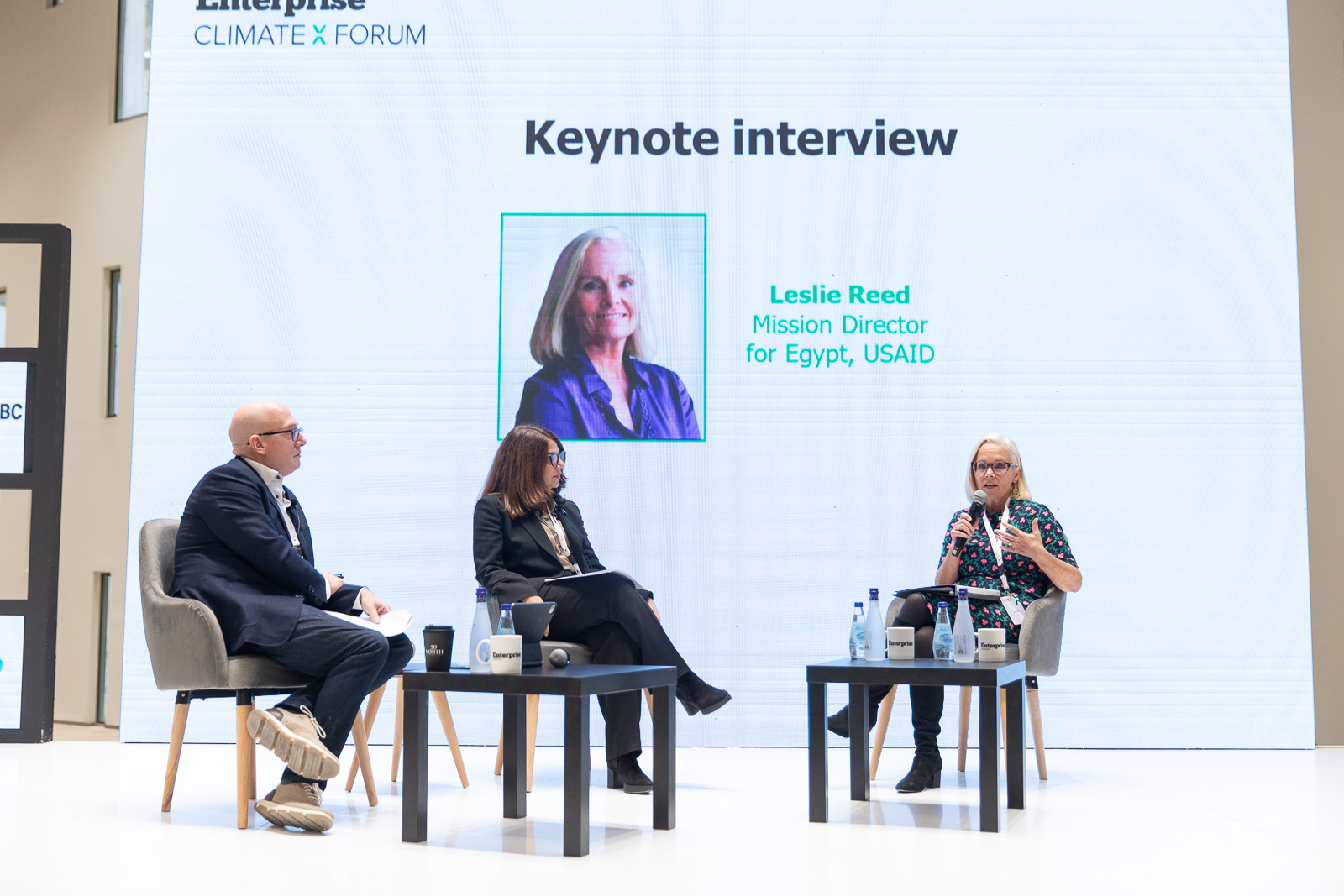How USAID is supporting Egypt’s green transition

A conversation with Leslie Reed (LinkedIn), mission director for Egypt at USAID, at Enterprise Climate X Forum: The inaugural Enterprise Climate X Forum we held last week saw us dive deep into the climate economy in Egypt, from green hydrogen to the recently launched Nexus on Water, Food and Energy (NWFE) and climate finance. Among our on-stage interviews, we spoke with Leslie Reed, mission director for Egypt at USAID, about how development agencies can support the green transition in emerging markets and what the agency has in store for Egypt.
Egypt, like other emerging markets, is facing a number of deeply interconnected challenges — particularly on climate and the economy, Reed said. “The economy is growing, but it’s not growing as fast as the population, so the government and service providers will be challenged,” she said. This is exacerbated by the fact that women, who make up half of the population, do not participate in the economy at the same rate as men, she said.
Why is this important for the green transition? “Egypt is a young country and it’s growing very fast,” Reed said, meaning there is a more demand for jobs than there are businesses and organizations who can provide them — let alone offer training to develop the needed skill sets among job seekers. When it comes to operating large-scale renewable energy projects — like the Benban solar power park for example — training is key, Reed noted.
That’s why a big part of what USAID does is invest in talent and capacity building: USAID partnered with the Education Ministry back in 2018 to develop a curriculum that trained over 300 technical school students in Aswan and Hurghada on renewable energy, in particular solar and wind power. “You need a lot of people to operate and maintain a huge solar park,” Reed said. “And we made sure women were part of that, so right now, we have 300 women who have the technical skills to engage in operations and maintenance at Benban and across the country.” The curriculum is now in three technical schools in Egypt, and it’s “building the workforce of the future,” Reed said.
The development agency also recently launched a climate-focused scholarship for Egyptian students: USAID at COP27 launched a scholarship program for students seeking training in sectors relevant to Egypt’s climate goals. The program will offer full benefits to some 700 students..
But there’s a missing puzzle piece: the private sector. “We want and need to partner with the private sector as we help the government develop curricula, as we help build out the skills base of young students,” Reed said.
Private investors are “less naturally attracted” to adaptation and resilience, Reed said, noting that adaptation attracts only about 10% of climate finance globally. “We think of the short term, but we need to be thinking of the longer term,” she said. “The returns on investment are around USD 10 per USD 1. If you pay USD 1 today to avoid a future problem, you save USD 10 potentially on the backend, so I think there’s an economic imperative,” she added.
That’s why USAID now has a mandate to bring in the private sector. “This is where I think development partners need to get involved to help de-risk,” Reed said, pointing to the work of the US International Development Finance Corporation (DFC). Where USAID incentivizes the private sector to participate in adaptation projects, the DFC responds and pulls them in with loans, assurances and de-risking opportunities, she explained. “We want to attract the private sector because we know they’re part of the solution,” she added.
USAID is also starting to shift to a more blended approach to financing: The development agency is working to catalyze more private finance to support its own lending activity. Initiatives like Catalyze aim to raise some USD 2 bn in financing over the next eight years. The USD 15 mn Red Sea initiative also includes plans to use blended financing as a mechanism to help support businesses in Red Sea cities in Egypt.
Reed is hopeful about the trajectory we’re on — but wants Egypt to leverage what it achieved during COP27: “There are some basic fundamentals like ease of doing business that are needed, and also the green particulars… but the COP presidency presents such an important opportunity for all of us,” Reed said. The agreements and initiatives launched during the summit — including NWFE — were important for Egypt — and gives us an obligation to follow through in time for the next COP summit, she said. “Nobody wants to go into the next COP not having made progress on that, so this is the window of opportunity to remove impediments,” she added.
** The Enterprise Climate X Forum is proud to be supported by USAID, HSBC, Mashreq, Attijariwafa Bank, Etisalat by e&, Hassan Allam Utilities, and Infinity.